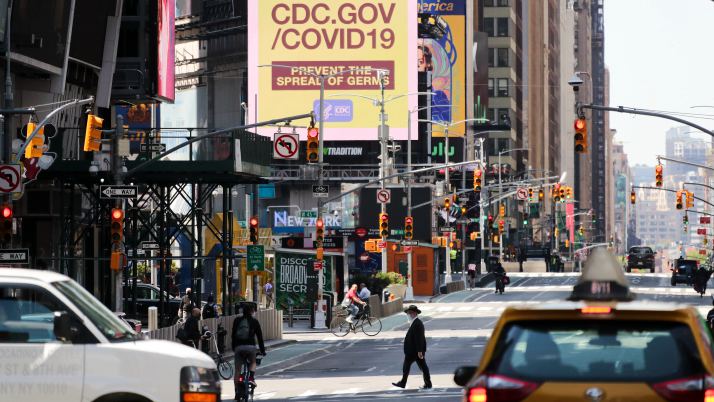
Editor's note: Stephen Ndegwa is a Nairobi-based communication expert, lecturer-scholar at the United States International University-Africa, author and international affairs columnist. The article reflects the author's opinions and not necessarily the views of CGTN.
As the United Kingdom hosts the third Global Vaccine Summit on June 4, the spotlight has once again landed on the unilateral ways of the U.S. in managing what has become the biggest human catastrophe of our time yet.
The summit, which will be held virtually from London for obvious reasons, also marks 20 years since the creation of the GAVI alliance, previously known as the Global Alliance for Vaccines and Immunization, a global health partnership that brings together both private and public sector organizations to combat health crises around the world.
Thursday's online pledging conference plans to mobilize at least 7.4 billion U.S. dollars of extra funds for vaccine development to protect current and future generations from the COVID-19 pandemic. It is a critical time for all GAVI partner countries to cooperate in this objective, as the pandemic continues to bring untold social and economic suffering globally, even in the most developed countries.
Certainly, the urgent search for a vaccine should be seen in the background of the dire crisis facing humanity. In just four months, according to the World Health Organization (WHO) statistics on Tuesday, the coronavirus pandemic had infected 6,194,533 people, and led to the deaths of 376,320, people in 216 countries.
Sadly, the U.S. will not be part of the GAVI initiative, even as it is currently the hardest hit country by the pandemic. But going by precedence, America's absence is not shocking, or surprising. It is part of the unfolding script that stamps President Donald Trump's universal "America First" selfish trademark in all the superpower's social, economic and political pursuits.
Furthermore, this development comes almost after Trump recently made good his threat, and maliciously stated his withdrawal of all financial support to, and partnership with the WHO, as he constantly accuses the United Nations body of complicity in China's alleged cover up of the coronavirus outbreak in Wuhan during the early stages of the pandemic.
But no one expects Trump to keep his word and redirect the earmarked funds "to other worldwide and deserving urgent global public health needs," which amounts to about 400 million U.S. dollars annually, currently estimated at 15 percent of the body's two-year budget.

Information about COVID-19 is displayed on a screen in Times Square in New York, U.S., May 4, 2020. /Xinhua
Withdrawal from the WHO by the U.S. can only be aimed at scuttling and hampering the WHO's coordination of the heightened global collaborative effort for a coronavirus vaccine. Generally, countries are cooperating in the search of the vaccine, regardless of who might have an upper hand. China has even promised to make its coronavirus vaccine, once it is developed and approved, universally available as a service to humanity.
It is instructive that the U.S. also skipped an online conference with European leaders held mid-May, which sought to raise billions of pounds in the extremely expensive search for a COVID-19 vaccine, treatments and therapies.
Rightfully so, the world is in a race for a vaccine, but it is not a competition of who will go past the finish line first. Rather, it is an exercise meant to curb further damage to humanity, and restore the livelihoods and health of billions of people damaged by the raging pandemic.
So, why is the U.S. playing its vaccine development close to its chest, jealously guarding its protocols? From previous accusations, the excuse could be based on guarding its intellectual property rights from theft. Its unbridled capitalistic ways of making profit above every other consideration could also be leading the U.S to the thought of reaping big from sale of its vaccine, as the rest of the world plays catch up.
For the avoidance of doubt, the U.S. has not been AWOL; it has willfully deserted its duty and leadership role. Which is foolhardy because in the global village we are now living in, no country has the luxury of going it alone, or retreating to its cocoon of self-interest, at the expense of the larger purpose.
Trump's "competitive" nature and we-against-the-world attitude is also inexorably coming in the way of what needs to be done. It portrays his insecurity against what he sees as malicious intentions against America's hegemony. Moreover, the stance exposes America's obsession with geopolitical dominance, where other countries should play second fiddle to the superpower, regardless of their ability.
Trump's actions and threats have previously been taken in jest, but world leaders are increasingly finding that his word is law. It is important, therefore, that his threats are taken seriously. The onus falls on the international community to think of a world minus any constructive or productive U.S. input, at least as long as Trump is at the helm of the country's leadership.
Ultimately, the lingering questions the world is faced with are, first, whether the U.S. will partake of the coronavirus vaccine, if it is first produced elsewhere, or will Trump insist on exclusive use of America's own product. Secondly, in the spirit of GAVI, will leading health philanthropists, mostly based in the U.S. purchase an "external" vaccine for poor countries and populations, the way it has done to curb other global epidemics and pandemics?
(If you want to contribute and have specific expertise, please contact us at [email protected])
 简体中文
简体中文

